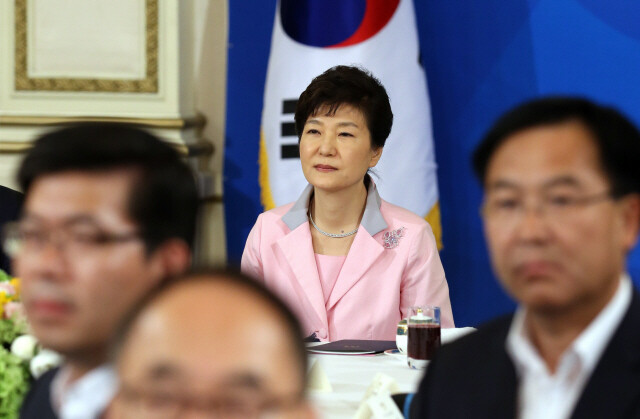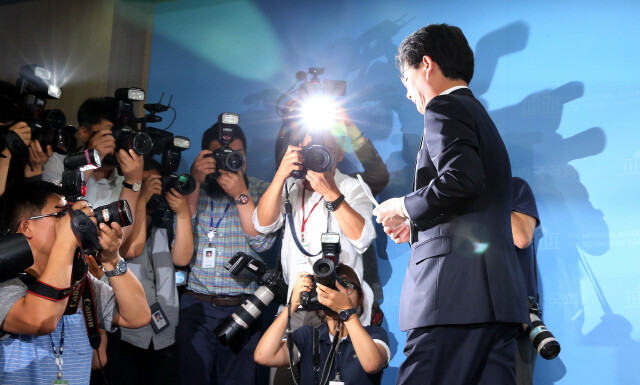hankyoreh
Links to other country sites 다른 나라 사이트 링크
[Editorial] Yoo Seong-min’s purge takes South Korea back to dictatorship

On July 8, Yoo Seong-min stepped down from his position as floor leader of the ruling Saenuri Party (NFP). Two weeks had passed since President Park Geun-hye lashed out at Yoo as “a traitor who only takes care of himself” as she vetoed a bill that would have amended the National Assembly Act. While on the surface Yoo’s resignation was voluntary, practically speaking the floor leader of the ruling party was purged by President Park.
Thus it is that South Korean politics have regressed to the period of dictatorial rule in the 1970s and 1980s when the president served as the head of the party and dominated party affairs. Even though we are living in an age when backward and reactionary behavior is a daily occurrence in various areas of society, it is stunning to think that the country’s party democracy, which has been gradually developing for several decades, could revert to the period of the military dictatorship all at once.
This is what Yoo said during the press conference in which he announced his resignation. “At any other time, I would have stepped down as floor leader right away. The reason that I waited so long was because there were values that I wanted to protect - the values of law, principle, and justice. I wanted to stake my political career on protecting the solemn value of the first clause in our Constitution, which states that South Korea is a democratic republic. I thought that, despite the confusion and inconvenience, someone needed to cling to and defend that value for South Korea to move forward.”
Yoo Seong-min, purged by the President
As we read through his resignation statement, we asked ourselves if this country is really a democratic republic. We had no choice but to ask whether a system can be democratic when the president forces out the floor leader of the ruling party simply because she doesn’t like him.
The presidential system is a political system that is supported by the pillar of the separation of powers, with the legislative branch checking the power of the executive branch. The moment that this is denied, democracy, which is the foundation of the presidential system, withers to the root. The head of a country who is not subject to the systematic restraint of the legislative branch is no different from a medieval monarch.
This is why it is no exaggeration to say that the political history of South Korea since the democracy protests in June 1987 has been the process of ending the president’s control of the ruling party and breaking the executive branch’s absolute domination of the legislative branch.
The pretext that Park used to force Yoo to resign was that he was not engaging in politics on behalf of the public. But every strongman, tyrant, and despot in history has seized upon the public as an expedient for achieving their own ambitions.
South Koreans will recall that the perpetrators of the military coups on May 16, 1961, and May 17, 1980, justified their actions as being the “will of the people.” Democracy is a form of politics that was codified to dilute power and to make elections the only way to determine the public will, precisely because it is so easy to falsely claim to represent that will.
The first clause of the Constitution declares that we must always stand atop the framework of just such a system.
President Park has disregarded this. She has dispensed with the separation of powers, which is the fundamental principle of democracy, and her behavior betrays her desire for the hegemony and royal power of an imperial president.
While this may have enabled her to successfully drive out the floor leader of the ruling party whom she had regarded as a thorn in her side, she ruthlessly trampled the value of party democracy into the dirt. While she may have forced 160 lawmakers with the ruling party to bend to her will, she is very likely to lose the trust of even more members of the party and the public. A momentary victory will not guarantee smooth sailing through the rest of her time in office.

Kim Moo-sung, Party Leader and Self-Described Puppet of the President
Saenuri Party Leader Kim Moo-sung is just as responsible as President Park for allowing the situation to end as it did. After acting in an opportunistic fashion from beginning to end, Kim was ultimately instrumental in forcing Yoo to step down, ostensibly to prevent division in the party. This was just as bad, if not worse, than what was done by the heads of parties appointed during the time of the military dictators.
Exactly one year ago, Kim edged aside Seo Cheong-won, a key member of the pro-Park faction of the party, to become the party leader. At the time, he promised to establish party democracy in which party members and the public would take ownership and to return the right of nomination to the public.
But lately, the Saenuri Party is behaving like an outdated party that bows so low before the president that it ought to be ashamed of even talking about party members and the public.
Given these circumstances, what good would it do to introduce open primaries? It would be naive to even expect President Park to willingly give up the power to nominate candidates in next year‘s general election.
Perhaps Kim doesn’t mind being called the leader of the ruling party who obeys what the president says, but this just shows that he will never rise to the ranks of politicians who carve out their own political destiny.
The Saenuri lawmakers were cowardly as well. The floor leader that they had elected was being forced to resign because of a single remark made by the president. Was it really appropriate for lawmakers who represent the public to pass the measure not with a vote but with applause?
When even Jeju Governor Won Hee-ryong and Daegu Mayor Kwon Yeong-jin are saying that Yoo should not be made into a scapegoat, it is stupefying to see lawmakers in the National Assembly - a constitutional body - fail to defend their own constitutional rights and authority.
These lawmakers who can’t even stand up to the president will no doubt describe themselves once again as public representatives during the general election. What could be more ironic than that?
Doubtless, it is no small segment of the public who are concerned about the future of politics in South Korea as they watch their representatives in the National Assembly, the ruling party leader, and the president abandon the most basic constitutional values and democratic principles.
The only consolation is that, reading Yoo’s resignation speech, we can get a glimpse of hope and righteous indignation even in the conservative party.
Please direct questions or comments to [english@hani.co.kr]

Editorial・opinion
![[Column] Is Korean democracy really regressing? [Column] Is Korean democracy really regressing?](https://flexible.img.hani.co.kr/flexible/normal/500/300/imgdb/original/2024/0705/2917201664129137.jpg) [Column] Is Korean democracy really regressing?
[Column] Is Korean democracy really regressing?![[Column] How tragedy pervades weak links in Korean labor [Column] How tragedy pervades weak links in Korean labor](https://flexible.img.hani.co.kr/flexible/normal/500/300/imgdb/original/2024/0703/8717199957128458.jpg) [Column] How tragedy pervades weak links in Korean labor
[Column] How tragedy pervades weak links in Korean labor- [Column] How opposing war became a far-right policy
- [Editorial] Korea needs to adjust diplomatic course in preparation for a Trump comeback
- [Editorial] Silence won’t save Yoon
- [Column] The miscalculations that started the Korean War mustn’t be repeated
- [Correspondent’s column] China-Europe relations tested once more by EV war
- [Correspondent’s column] Who really created the new ‘axis of evil’?
- [Editorial] Exploiting foreign domestic workers won’t solve Korea’s birth rate problem
- [Column] Kim and Putin’s new world order
Most viewed articles
- 110 days of torture: Korean mental patient’s restraints only removed after death
- 2Months after outcry over “torture devices,” Justice Ministry proposes more restraints for immigratio
- 3Beleaguered economy could stymie Japan’s efforts to buoy the yen
- 4[Column] Is Korean democracy really regressing?
- 5Koreans are getting taller, but half of Korean men are now considered obese
- 6[Column] How tragedy pervades weak links in Korean labor
- 7Former bodyguard’s dark tale of marriage to Samsung royalty
- 8Real-life heroes of “A Taxi Driver” pass away without having reunited
- 9[Editorial] Exploiting foreign domestic workers won’t solve Korea’s birth rate problem
- 10Democrats ride wave of 1M signature petition for Yoon to be impeached